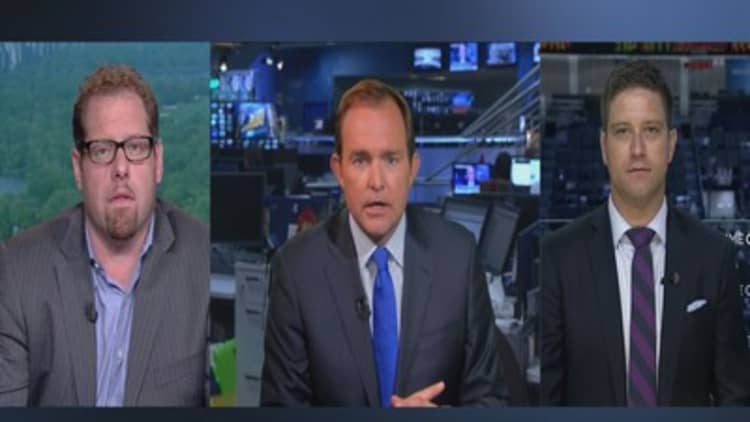
After months of fearing a rate hike, are markets suddenly hoping for one?
Stocks fell steeply on Sept. 18, one day after the Federal Reserve announced its intention to keep monetary policy at ultra-accomodative levels. Yet on Friday, a day after Fed chair Janet Yellen said she was still looking to raise rates in 2015, the opened the day much higher—albeit giving up those gains before the close.
Still, market watchers say Yellen's remarks could signal a gradual shift away from the loose money conditions that have prevailed since the 2008 financial crisis.
"I think we may be in this 'Alice Through the Looking Glass' scenario in which a rate hike is taken as positive news to the extent that it sends a positive signal about our economy," said Scott Clemons, chief investment strategist at Brown Brothers Harriman.
Read MoreThere may be a problem with the Fed's inflation call
In its most recent statement, Fed policymakers said "recent global and financial developments may restrain economic activity somewhat and are likely to put further downward pressure on inflation in the near term." Such language "led us to wonder what the Fed knows that the rest of us don't know," Clemons said.
Alternately, investors may fear that if the Fed only starts raising rates in December, the central bank will be forced to raise rates more quickly and forcefully to combat incipient inflation, Clemons said.
Yellen actually acknowledged such fears last week in making the case for a 2015 rate hike.
"If the FOMC were to delay the start of the policy normalization process for too long, we would likely end up having to tighten policy relatively abruptly to keep the economy from significantly overshooting both of our goals," Yellen said, referring to full employment and 2 percent inflation.
Conversely, the argument that a rate hike would be bad for stocks is straightforward.
In a world where borrowing money is cheap, and bonds yield are next to nothing, companies and consumers are encouraged to invest. In theory, that should lead to an economic scenario that helps equities and creates a virtuous cycle of growth. Investors, meanwhile, are encouraged to take more risk in order to generate returns, creating excess demand for stocks.
'Tug of war'
Of course, market sentiment need not be monolithic. In the words of Max Wolff, chief economist at Manhattan Venture Partners, there is an ongoing "tug of war" between those who want to see the Fed hike and those who don't.
"We have one constituency that's seen this crouching tiger of inflation around every corner and been wrong for years, but eventually they'll be right and they're impatient," Wolff said Friday on CNBC's "Trading Nation."
On the flip side, "we have folks who just like cheap money and everyone being forced into risky assets. And they're a little bit nervous about this rate hike, even though some of them ironically have called for it, too," he added.
Wolff said he believes the Fed will raise rates this year, and may implement one or two more hikes in the following scheduled meetings.
"It's kind of a weird, perverse scenario to begin with," Wolff said. "Even if we get a couple 25-to-50 basis point pullups here, we're still going to be anomalously low by international and historical standards."
Read More The sneaky way that the Fed may be hurting stocks
Once rates do go up, it could create opportunity for a lot of traders, said Phillip Streible, senior market strategist at RJO Futures.
"It's like a Band-Aid we've got to rip off eventually," Streible said Friday. "It would start a whole new wave of trades that people like myself, guys in the pit, we could start to play that new action in the market."
Of course, pleasing the guys in the trading pit is not part of the Fed's dual mandate.
Want to be a part of the Trading Nation? If you'd like to call into our live Wednesday show, email your name, number, and a question to TradingNation@cnbc.com






